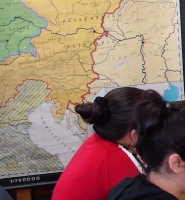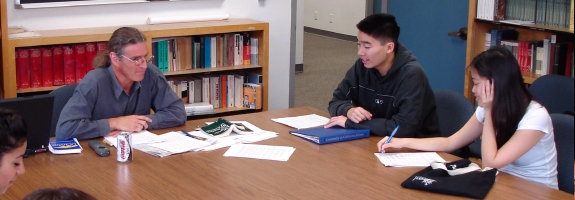






Recent Seminars
• Fall 2013• Fall 2012 • Fall 2011 • Fall 2010 |

FALL 2013 TRANSFER SEMINARS
SCHOOL OF ARTS How a Composer Thinks (How Composer Thinks in SOC) We all love music, many of us play music, but few of us have insight into how a composer creates a new piece of music. Who better to explain that process than composers themselves? In this seminar, led by a faculty composer from the Music Department, we will read and hear firsthand accounts by
composers discussing the process of composition. Students will encounter new music and new perspectives on its production from renowned
composers
past and present. No prior music training is required. Assignments: The course will include an overview of the topic of composition, lecture/discussions with several different UCI faculty composers, writings about composition by famous composers past and present, some analysis of how musical form and structure work. Christopher Dobrian is Professor of Music (with a joint appointment in Informatics) specializing in composition and music technology. He is a founding member of the MFA program in Integrated Composition, Improvisation, and Technology (ICIT) at UCI, and is the director of the Gassmann Electronic Music Studio, the Realtime Experimental Audio SCHOOL OF INFORMATION AND COMPUTER SCIENCES Cyber-Puzzlers and Interview Questions (Cyber-Puzzlers in SOC) Through in‐class discussions and brain storming sessions, this course will study cyber‐puzzlers and brain teasers, which are often used during job interviews as a test of Mathematical and Computational thinking. Special attention will be paid to puzzlers that have a relationship to computer science topics. Problem solutions will need only high school mathematics and logic. Recommended Reading: Polya, How to Solve It, 2009. Professor Goodrich''s research is directed at the design of high performance algorithms for solving large‐scale problems motivated from information assurance and security, the Internet, information visualization, and social computing. Cybersecurity for Windows and Android Devices (Cybersecurity in SOC) Devices running Windows and Android operating systems are used everday for all kinds of activities, from social networking, to gaming, to banking. These devices are constantly exposed to network‐based cyberattacks and users need to understand basic steps to protect themselves and their devices. This seminar will teach students the basics of these attacks and the simple (or not so simple) defenses that can be used against them. The class is designed for regular computer and device users, so a major in Computer Science is not necessary. We will discuss how devices behave on the network and what that makes them vulnerable to attack. We will discuss how you can change the behavior of your device to improve security. We will talk about desktop/laptop machines, but also mobile, wireless devices and the vulnerabilities specific to them. We will have demonstrations showing you Readings: Selected online readings will be provided during the course. Ian G. Harris is currently an Associate Professor in the Department of Computer Science at UCI. He received his BS degree in Computer Science from Massachusetts Institute of Technology in 1990. He received his MS and PhD degrees in Computer Science from the University of California San Diego in 1992 and 1997 respectively. His research interests involve the security and testing of hardware and software systems. Beyond Java and C++: Functional Programming in Scheme (Beyond Java and C++) In the 60 years we''ve had high‐level programming languages, we''ve learned some things about how to write reliable software quickly, cheaply, and accurately. Some of those things are part of common programming languages like Java or C++, but some aren''t: The technique of functional programming and the programming language Scheme provide a perspective on programming and a set of advantages that''s different from what you get in Java or C++. (Some UCI students have seen this material in ICS 33, ICS 22, or Informatics 41. This seminar gives transfer students the same experience References: * Introduction to Scheme and Racket, http://docs.racket-lang.org/quick/index.html * How to Design Programs, second edition, online at Students will be encouraged to bring laptops to class for brief mini-lab sessions; there will also be modest suggested exercises for them to try (typically in pairs) between class meetings. David G. Kay came to UCI from UCLA in 1990. He has been teaching computer science in one way or another since 1971, so he has seen a lot of programming languages come and go. Besides computer science, he holds degrees in linguistics and law; at UCI he teaches courses in introductory computer science (for majors and for non-majors), human-computer interaction, programming languages, technical communication, pedagogy for TAs and for undergrads, and computer law. SCHOOL OF MEDICINE Introduction to Immunology (Intro to Immunology in SOC) This is a basic course in immunology that is intended to be an introduction to the subject. The seminar will focus on immunological mechanisms responsible for major diseases (cancer, transplantation, infections, autoimmunity etc) by defining some commonly used terms and describing the specific cells and tissues involved in these diseases. Immunotherapy against these diseases will also be discussed. We will discuss news articles in immunology related to many diseases and understand the basic immunology related to the disease. Anshu Agrawal is a faculty in the school of medicine. Her expertise lies in the area of innate immunity with particular focus on dendritic cells. Her research focus is on manipulation of immune response using dendritic cells as well as to understand the age-associated changes in the function of these cells. SCHOOL OF SOCIAL SCIENCES Globalization: Problem? Or Panacea? (Globalization in SOC) The word "globalization" is familiar to anyone tuned into global media, and is rapidly emerging as the favorite mantras of political leaders, business executives and news reporters all around the world. It is clearly one of those faddish buzzword that is frequently used but rarely defined (and heavily laden with ideological implications). In this seminar we will explore what"globalization" means. We will try to examine the long-term historical origins of a modern world-system, as well as grapple with more recent worldwide
political and economic changes that occurred in the last two or three decades.
Finally, we wi'll analyze and discuss whether a world beset with myriad problems (grinding poverty and inequality, international tension and terrorism, severe Readings:
David A. Smith is a Professor of Sociology (and Planning, Policy and Design) at UCI. His research focuses on world‐system analysis, global trade and commodity chains, world cities and comparative urbanization, and social change in East Asia. He is the Editor of INTERNATIONAL JOURNAL OF COMPARARIVE SOCIOLOGY and a former collegiate track and cross-country runner who still runs several miles every day. |
||||||||||||||||||||||||||||||
| Transfer Seminar Program 611 Aldrich Hall Irvine, CA 92697-5670 Phone (949) 824-1955 Fax (949) 824-2161 A Division of Undergraduate Education Program © 2013 The Regents of the University of California All Rights Reserved |
